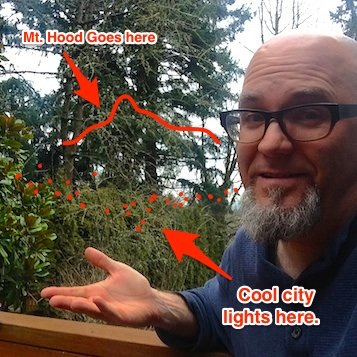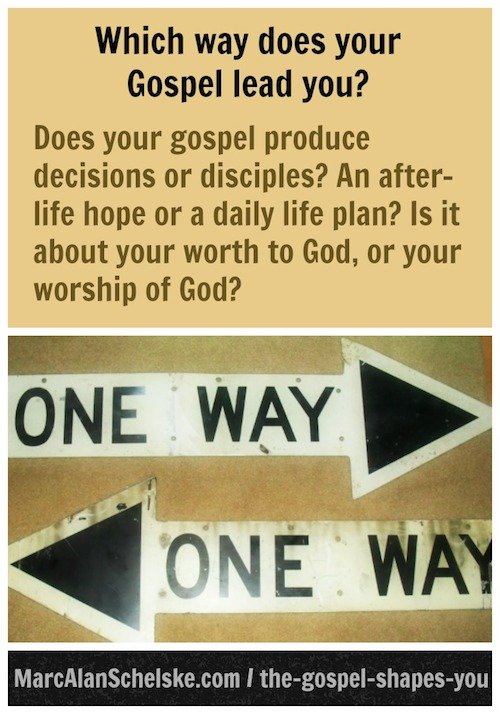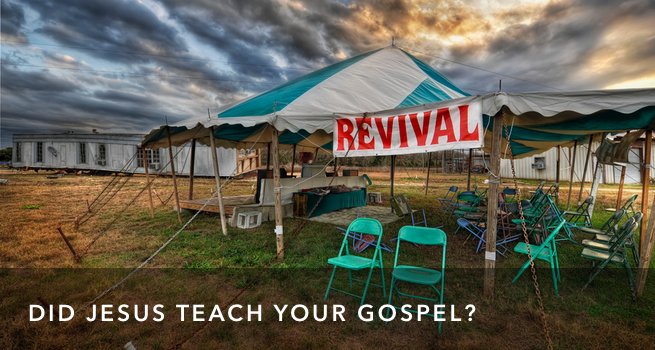7 min. to read.
My back deck has the potential for an incredible view.
We sit above a small valley, so I ought to be able to see lights below. The direction our deck faces ought to give me a full panorama of Mount Hood.
I don’t get to see any of that. The property just below ours is full of beautiful, giant trees. They give us privacy, but they also block the view.
If I stand in just the right place I can see slivers of the valley below, and maybe even catch an edge of Mount Hood. I know there’s an incredible view there, but what I can see is just a fraction of what’s there.
Christians have this same problem with the Gospel.
Did Jesus teach your gospel?

The Gospel is important. To Christians it’s the central thing. Everything in life ought to be oriented around our understanding of the gospel.
Yet, for many exactly what the gospel is remains muddy. Worse, many people think they are clear on the subject, and they don’t realize they are only seeing a sliver of the view.
This matters more than you think. If you’re only seeing a sliver of the view, and you’re making life decisions on the basis of what you see, you may be missing out on something incredible.
The most well-known telling of the Gospel goes like this:
Humanity has sinned. That sin separates us from God. But God made a way! Because of God’s grace extended through Jesus Christ’s death on the cross, we can be saved from sin. When we accept this gift, and follow Jesus as Lord and Savior, we’re saved from hell and judgement. We’re given new life now and access to heaven and eternity with God forever.
That’s the gospel as it’s often taught. That’s the gospel sketched out in tracts and on T-shirts. It’s easily supported from scripture. For many of us it has provided incredible hope and courage.
But—and this may come as a shock—none of this was taught by Jesus. Not directly. It’s not wrong. It’s just profoundly incomplete. If you had the opportunity to ask Jesus what the gospel was, you’d hear something different, something bigger. It might sound something like this:
Don’t fear! The kingdom of God has come among you. Follow me, do what I teach you, so that you can live within this new Kingdom now, and be a part of expanding the reign of God in this world.
Note: If that’s news to you, and you’d like a little Bible on that, check out these passages: Mark 1:14-15, Matthew 4:23, Luke 4:43, Luke 17:21, Matthew 6:9-13 along with an incredibly thoughtful Biblical study by Dr. Mark Roberts, here.

The first gospel story–The Salvation Story–is a part of the second. It’s a focus on something I can do (accept Jesus) and the benefits that brings me. It highlights two key moments in a person’s life, but if it’s the whole story, it leaves us with very little direction for the rest of our lives.
The second telling–The Kingdom of God Story–is the big, wide-open view that can change everything for you.
Where is your gospel leading you?
Whatever view you have of the Gospel is incredibly formative for your life. Think about how these two different gospel stories impact us.
The Salvation Story has a certain set of outcomes.
- This gospel produces decisions. Everything is built around getting people to decide for Jesus. Churches feel successful when they can track a growing number of decisions, and many churches have become incredibly good at getting them. (It’s part of what makes organized Christianity feel like a machine sometimes.)
- This gospel story inevitably focuses on the end result of a person’s life. Salvation or judgement. Heaven or hell. These are undoubtedly powerful ideas, but if we’re honest, for most of us they seem pretty far removed from our daily lives.
- In this story you are primarily responsible to choose, by an act of will. In some communities that is accompanied by a responsibility to behave in certain ways in order to validate the decision you made. Once you’ve chosen (and then behaved) what is there for you to do, other than help other people make that same decision?
- This gospel asks us to focus our thinking on spiritual reality, things like the soul, religious behavior, heaven, theology. Interesting, for sure. Important, you bet! But unless you have a way to connect the dots from these to daily living, they won’t matter much to you. (This is demonstrated by survey after survey that shows that evangelical Christians, who believe “all the right things,” don’t have markedly different lives than the non-Christian community around them.[note You can find a brief summary of one survey here, or read the results in the book Second Coming of the Church, by George Barna. That right there is an affiliate link. If you buy the book through Amazon, I’ll get an infinitesimal kickback that I promise to spend on more books.])
- Inadvertently, trying to live according to this gospel story leads to compartmentalized living. Religious activities, religious conversations, religious music all matter more than the rest of life—which, unfortunately, is the part of life most of us have to spend most of our time in.
Contrast this with the implications of the Kingdom of God Story:
- This gospel produces disciples, people who are committed to learning how to live (now and forever) from Jesus. It’s not just about what you choose; it’s about who you are becoming.
- This gospel announces the beginning of a new way of living, instead of focusing on the end result of your life.
- In this story, you are responsible to live as a follower of Jesus, your whole life informed by Jesus’s teaching and guided by your growing relationship with Jesus.
- This gospel asks you to think about your entire reality including your choices, your relationships, your work, your words, and see them all as a response of worship.
- This gospel suggest that every moment of every day is sacred.
- Trying to live according to this Gospel story leads toward integrated living, where your entire life is encompassed by God’s reign.
Which gospel do you believe? Does your gospel produce decisions or disciples? Does it provide you with a hope for life after death, or does it give you more–including a plan for your everyday life? The Gospel wasn’t meant to just change your eternity. It was meant to change your every-day life. This correction of the story isn’t trivial. What you believe about this dramatically alters how you live, and what you think is important.

About 3 years ago my world was completely rocked when I recognized that the gospel was not for salvation alone, but for my sanctification as well. (In everyday language) – The story that saved me is the story that changes me from the inside out to look more like Jesus. Milton Vincent’s – A Gospel Primer for Christians was instrumental in “preaching the gospel” to myself on a daily basis. Since then I’ve had other great resources confirm this idea: Explicit Gospel – Matt Chandler, Jesus + Nothing = Everything – Tullian Tchividjian and Gospel – Recovering the Power that Made Christianity Revolutionary – J.D. Greear.
There’s a real movement in our generation to return to the power of the gospel for daily life. Thanks for doing your part on this blog post. I’ll be checking out the resources you suggest.
Thanks for the comment, Jeremy. I’m a life-long church kid and PK, and I’ve spent a whole lot of years wondering why we talked so much about abundant life and life change, and yet I so very rarely saw anything that looked like it. I don’t necessarily like the old language of justification and sanctification–that’s evidence of my baggage–but I love the idea that Jesus has called me to follow and learn how to do life from Him. I’ve been using the language of apprentice because of how that speaks to me.
Thank you for your description of your backyard and what you are able to see and not see. It’s my observation that too many of us only see what is right in front of our eyes, both literally and figuratively and don’t look or think beyond this perspective. I am attempting to see further down my particular road and my specific backyard and do serious thinking and planning for the known and the unknown.
Hey! Thanks for leaving a comment. Hearing from you always brightens my day.
Early in my life with Jesus I had a pastor who encouraged us to always be reading the gospels daily, one end to the other and then start over again, no matter what other parts of the bible we might be reading. I can’t say that I have been consistent, but I honestly have a different understanding of the teachings of Jesus than the majority of Christians that I know, and I attribute it to making his words my main focus.
That’s incredibly good advice. The Gospels must be the lens through which we see the rest of scripture. I’m sure that practice has really impacted your heart and relationship with God. Thanks for sharing it.
Good post Marc. The lens or the way we view the gospel affects our lives in profound ways. Thanks for pointing out how these views can and often do affect us.
Thank you Marc for your blog. I am currently preparing a Sunday school class on Preaching the Gospel to Yourself. Understanding the greatness of the grace of God in Christ definitely affects the way we live our daily lives. Oh, how the gospel should affect every single facet of our lives!
I am, like you, a PK and an MK.Thank you for sharing the Salvation Story and the Kingdom of God story.
Soli deo gloria
Hey Debbie, thanks for your kind words. Living in Grace is definitely transformational. Thanks for reading and commenting. I hope your class goes well.